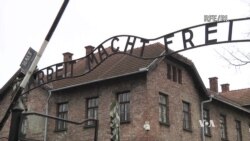Dagmar Lieblova was 14 when she arrived at Auschwitz in December 1943, along with her entire Czech Jewish family. All of them were to die there, but she was able to leave after several months due to a bureaucratic mix-up which saved her life. Now 85, with three children and six grandchildren, she says she has a feeling of victory.
Auschwitz is still a chilling place. It was purpose-built for mass murder. And more than a million people died there. But the survivors can bear witness to what happened. Among them Dagmar Lieblova, whose mother and sister both perished in the camp.
"Well I was almost 15, and I couldn't imagine that everything would be over," she said. "That I would never see anything else but just the blocks and the wire, I would never in my life see a tree or a piece of grass."
Damar had every reason to think that she too would end in the Auschwitz crematorium. Shortly after she arrived, her uncle, aunt and cousin were all killed in the gas chambers. She spent her days helping her mother empty the latrines. It was grim work, on an empty stomach.
"The food was very simple... it was in the morning there was what they called coffee - a sort of warm liquid," she said. "In the day there was a portion soup. And then a piece of bread in the evening ."
But Dagmar was about to be saved by an incredible stroke of luck. The Nazis made a list of workers aged 16-40 to undertake war work in Germany. Dagmar's name was on it. Her date of birth should have been written 1929 - but instead, it said 1925.
"Because of this mistake, that someone wrote a '5' instead of a '9' it saved my life," she said. "There was a train standing and we stepped in, and it moved, and we didn't believe we were leaving. We couldn't believe that we were really leaving Auschwitz."
Like so many others... Dagmar's family all died here. Dagmar spent the rest of the war working in Hamburg. Only once, 20 years ago, did she return. She won't come back again.
"Auschwitz is a cemetery for my parents, my sister, almost all my relatives," she said. "Everything comes back again. No, I wouldn't go there any more. It's too hard."
But Dagmar, at home surrounded by books and photos, is not bitter. Life, she feels, has triumphed.
"Now when I see my children and grandchildren I have a feeling it's a victory. Because I was not supposed to be here," she said.
Auschwitz is now a museum, a reminder of the inhuman cruelty perpetrated by the Nazis -- but Dagmar's life is a testament to the resilience and power of the human spirit.










